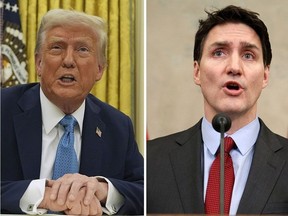The Financial Post brings you the latest news in Canada’s trade war with the U.S.

Article content
Sweeping U.S. tariffs on Canadian goods went into effect today after U.S. President Donald Trump dashed hopes of a reprieve on Monday.
Article content
Article content
Canada is retaliating with $30 billion in tariffs of its own, with an additional $125 billion in levies set to take hold after 21 days.
Click here to go straight to live updates
Mexican President Claudia Sheinbaum said today her government would announce tariffs and other measures on Sunday in response to Trump’s new charges. She said she expects to speak with Trump on Thursday.
Advertisement 2
Article content
Trudeau was to hold a press conference in Ottawa Tuesday morning with Finance Minister Dominic LeBlanc, Foreign Affairs Minister Melanie Joly and Public Safety Minister David McGuinty.
“Our tariffs will remain in place until the U.S. trade action is withdrawn, and should U.S. tariffs not cease, we are in active and ongoing discussions with provinces and territories to pursue several non-tariff measures,” Prime Minister Justin Trudeau said in a statement Monday. “While we urge the U.S. administration to reconsider their tariffs, Canada remains firm in standing up for our economy, our jobs, our workers, and for a fair deal.”
Watch Trudeau’s press conference
This morning, economists warned that the tariffs could throw Canada’s economy into recession, and markets plunged while the Canadian dollar is remarkably holding its own.
The trade war notched its first casualty when an aluminum plant in Bécancour, Que. was shutdown, but concern grows for Canada’s auto industry.
President Trump has once again taken aim at Canada’s banking sector, and RBC CEO Dave McKay warns that consumers will also feel the effects of tariffs right away.
Article content
Advertisement 3
Article content
Click here to go straight to live updates
How did we get here?
Any possibility that tariffs on Canada and Mexico might be delayed or reduced was seemingly quashed Monday afternoon when Trump declared there was “no room left” to negotiate on the 25 per cent levies, which were originally announced in January.
“I would just say this to people in Canada or Mexico, if they’re going to build car plants, the people that are doing them are much better off building here because we have the market,” Trump said during a press conference.
Trump’s confirmation that the tariffs on Canada and Mexico would proceed — and that tariffs on China would be doubled to 20 per cent — sent stock markets tumbling, with the Dow Jones industrial average dropping close to 650 points and the S&P/TSX composite index falling nearly 400 points.
The development came after the U.S. Secretary of Commerce Howard Lutnick suggested earlier Monday on CNN that tariffs were not yet set in stone, and could be less severe than originally planned.
Which companies will be most impacted?
Potash miner Nutrien Ltd. is Canada’s most at-risk company when it comes to U.S.-imposed tariffs, according to a report from direct indexing platform Syntax Data.
Advertisement 4
Article content
The Saskatchewan-based company tops a list of the top 10 Canadian companies with the highest exposure to tariffs based on U.S.-generated revenue, using a proprietary classification system with data from 11,000 publicly listed companies.
The Syntax Data report says Nutrien’s customers could shoulder US$4.41 billion in additional costs from tariffs.
Four out of the top 10 at-risk firms identified in the report are energy production giants Enbridge Inc., TC Energy Corp., Suncor Energy Inc. and Parkland Corp.
The other most at-risk companies on the list based on tariff-impacted revenue are Magna International Inc. (US$10.85 billion), Barrick Gold Corp. (US$6 billion), Saputo Inc. (US$5.78 billion) and Bausch Health Companies Inc. (US$5.19 billion).
How is Canada responding?
Trudeau announced he would slap tariffs on $155-billion worth of U.S. imports, $30 billion of which would be immediate, with the remainder coming after 21 days.
On Monday, Ontario Premier Doug Ford announced Ontario would be taking U.S. alcohol off store shelves and would be ripping up a rural internet contract with Elon Musk’s Starlink.
Ford has also threatened cutting the power to 1.5 million U.S. homes.
Several other provinces have announced similar responses, primarily pledging to pull U.S. liquor from store shelves and to review government contracts with U.S. companies, though Alberta’s government doesn’t believe in retaliatory tariffs.
Tariffs live blog
Recommended from Editorial
With files from Financial Post staff, The Canadian Press and Bloomberg News
Article content



